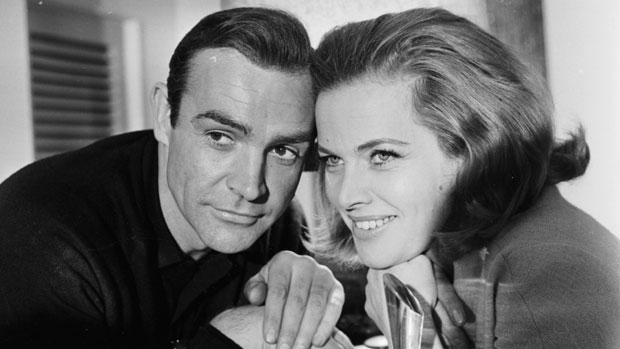Ian Fleming romance points up ambiguous attitude to spying
Why did Edward Snowden's revelations about state surveillance not rattle us? Fleming has the answer

A free daily email with the biggest news stories of the day – and the best features from TheWeek.com
You are now subscribed
Your newsletter sign-up was successful
WHY are the British so blasé about being spied on? When Edward Snowden spilled the beans about the wholesale surveillance of our digital lives, Germany erupted and we barely mustered a shrug.
The answer, or part of it, lies in programmes like Fleming, Sky Atlantic's new war-time drama about Ian Fleming, the creator of James Bond.
In last week's opening episode we saw him as a young man, gadding about Europe as the Nazis rose to power. Ian is, in his own words, "the lesser Fleming", overshadowed by the literary success of his older brother and, according to his only client, "quite the worst stockbroker in London".
The Week
Escape your echo chamber. Get the facts behind the news, plus analysis from multiple perspectives.

Sign up for The Week's Free Newsletters
From our morning news briefing to a weekly Good News Newsletter, get the best of The Week delivered directly to your inbox.
From our morning news briefing to a weekly Good News Newsletter, get the best of The Week delivered directly to your inbox.
Then Naval Intelligence comes knocking, attracted by the keenness of his mind and not too discouraged by his insubordination. "My father told me only two people should be called sir: God and the King," he tells the Rear Admiral. "And I have my doubts about the King."
We can warm to a man like that - a handsome, arrogant bad boy who's fighting the good fight. Dominic Cooper plays him perfectly, his good looks hardened by a lip curled in disdain. It's tough to imagine someone less like the earnest, nerdish Snowden.
Last night's second episode did not quite match the verve and pace of the first, but it was still tremendous fun. Fleming, in full proto-Bond mode, was sent off to Paris to prepare the British embassy for the fall of France. Then, on no one's authority but his own, he set about trying to stop the French fleet falling into German hands.
How much of it is true? Some of it, probably, but the disclaimer flashed up at the end of each episode is unusually broad: events, people, places and other inconvenient truths have all been changed.
A free daily email with the biggest news stories of the day – and the best features from TheWeek.com
But it brings us to another truth, if only in passing. In Britain, espionage conjures Fleming and Bond, sex and danger, dark deeds done for fine reasons. If short-cuts are taken along the way, they merely hasten the path towards a greater good.
In Germany, though, spying and surveillance provoke darker thoughts - of the SS and the Stasi and the crushing fear of state tyranny.
If the Germans were to make a modern-day version of Fleming, the hero would look a lot more like Edward Snowden.
Part 2 of Fleming is repeated on Sky Atlantic at 11pm, Thursday 20 February. Part 3 will be shown on the same channel at 9pm, Wednesday 26 February
Holden Frith is The Week’s digital director. He also makes regular appearances on “The Week Unwrapped”, speaking about subjects as diverse as vaccine development and bionic bomb-sniffing locusts. He joined The Week in 2013, spending five years editing the magazine’s website. Before that, he was deputy digital editor at The Sunday Times. He has also been TheTimes.co.uk’s technology editor and the launch editor of Wired magazine’s UK website. Holden has worked in journalism for nearly two decades, having started his professional career while completing an English literature degree at Cambridge University. He followed that with a master’s degree in journalism from Northwestern University in Chicago. A keen photographer, he also writes travel features whenever he gets the chance.
-
 Antonia Romeo and Whitehall’s women problem
Antonia Romeo and Whitehall’s women problemThe Explainer Before her appointment as cabinet secretary, commentators said hostile briefings and vetting concerns were evidence of ‘sexist, misogynistic culture’ in No. 10
-
 Local elections 2026: where are they and who is expected to win?
Local elections 2026: where are they and who is expected to win?The Explainer Labour is braced for heavy losses and U-turn on postponing some council elections hasn’t helped the party’s prospects
-
 6 of the world’s most accessible destinations
6 of the world’s most accessible destinationsThe Week Recommends Experience all of Berlin, Singapore and Sydney
-
 James Bond: Did Fleming hide WW2 secrets in his novels?
James Bond: Did Fleming hide WW2 secrets in his novels?Speed Read Author Sinclair McKay claims 007 creator references Bletchley Park codebreaking secrets in his novels
-
 Pussy Galore returns in new Bond novel Trigger Mortis
Pussy Galore returns in new Bond novel Trigger MortisSpeed Read James Bond reunites with violet-eyed lesbian gangster in Horowitz's new spy thriller